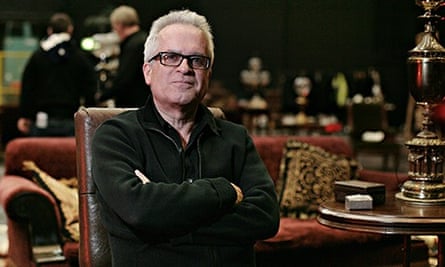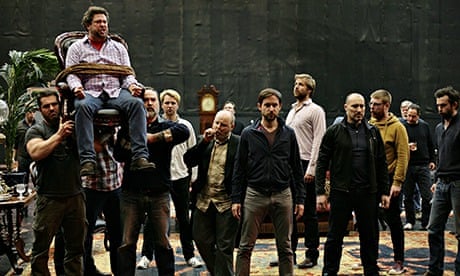In 1982 Jonathan Miller directed a new Rigoletto for English National Opera in which he updated the action to 1950's Little Italy in New York. Verdi's Duke of Mantua became a Mafia capo, Rigoletto his bartender, and one of the opera's most well-known arias, La donne e mobile, a jukebox hit. Miller's production was an instant critical success, bringing in a new audience and cementing the ENO's growing reputation as one of the world's most creative and innovative opera houses. Thames TV recorded the show for live broadcast and there was even talk of transferring the production to a West End run with alternating casts.
Miller's production did transfer to New York and was revived 12 times at ENO, most recently in 2009, and remained an audience favourite. Unlike some long-serving productions, Rigoletto never became a creaking old war-horse wheeled out every few years as a reliable crowd-pleaser; some of the surprise of its staging may have gone, but its realisation was every bit as fresh and satisfying. But no opera house can stand still, and ENO is now putting on a new Rigoletto, directed by Christopher Alden.
It's a big call for everyone. Miller's Rigoletto has been ENO's calling card for 30 years and its audiences have become almost as proprietorial over it. Like Miller's Duke, it's not something to be messed with. For Alden the stakes are just as high. How does he follow a show that has been in the repertoire for so long?

There must be a temptation to play it safe; to put on a traditional production set in Italy that pushes no boundaries and offends no one. A holding operation: damage limitation. That this Rigoletto is a co-production with the Canadian Opera and was given its first outing in Toronto in 2011 might give some credence to this. Give the production time to bed down on the other side of the Atlantic in an opera house that doesn't have the same history with the piece, iron out the rough patches and bring it over to the Coliseum as the finished article.
But check out the production's history. Alden first produced this Rigoletto for the Lyric Opera in Chicago in 2000: its reception was mixed - to say the least. "Let's just say it divided people," Alden says wryly, during a break in rehearsals. "Some loved it, some hated it." He smiles. 'There were some boos on the first night. But the Lyric Opera does have a very conservative audience. They like their operas done in a very particular way and this crossed the line for some of them.
"At the time, the Lyric was trying to nudge its audience towards a different style of production, but I guess it didn't work out. After its first run, I was given to understand the Lyric would revive the production in a couple of years. A year or so later, I got a call from the director saying the company had changed its mind. Money was tight, sponsors and audiences weren't yet ready for this style of opera and they were going to go back to something more trad. Blah, Blah. Whatever..."
And that was that for 10 years until Toronto and English National Opera expressed an interest in remaking it. So has the intervening decade been kind to Alden's vision? Were audiences now more ready for his Rigoletto? He laughs. "Not exactly," he says. "It got pretty much the same mixed response as in Chicago. But then, Toronto audiences do also tend to be quite staid." Quite. One Canadian critic wrote: "Consider it official. The Canadian Opera Company is a European house. All the hallmarks are there: good soloists, a reliable orchestra, a sturdy chorus, intelligent, committed conducting. And, of course, ridiculous stagings."
Which leaves the question hanging. Is Alden's staging ridiculous or has it just needed a European audience to appreciate it? "I would hope it would be better received here," he says. 'But I can only present the opera in the way I see it. I think one of the reasons some people have had such a strong reaction to the show is that they feel they have been lured into believing it was going to be a traditional production. Once you had accepted the 1950s staging of Dr Miller's Rigoletto – of which I am a big fan – it was actually quite an orthodox production. When the curtain rises on mine, the 19th century Zeffirelli feel to the set will initially feel very familiar to opera-goers. [But] thereafter..."
It may not. The action in Alden's Rigoletto takes place in a gentleman's gaming club in the early 1850s - the period of the opera's composition. The power struggles between the men, between the men and women, and the private and the public are just some of the games to be played out. Relationships are almost uniformly perverse - none more so than that of the assassin Sparafucile and his sister Maddalena, who are played as an incestuous couple. The chorus is on stage throughout as accessories to the action; their complicity a mirror of the audience's.
Alden is too long in the tooth to be a provocateur. He's been directing opera around the world since the mid-1970s and he doesn't need to stir things up for the sake of it. His commitment to this Rigoletto is absolute; in rehearsals he is ruthless for detail, picking up members of the chorus who have moved position a beat too early. But he does accept that some people may take issue with his ideas. "You just have to put it out there and hope," he says.

Comments (…)
Sign in or create your Guardian account to join the discussion